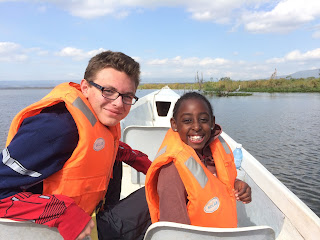Over looking the townships of Durban
from the grave of John Dube in Ohlange.
John Dube was the founding president of the South African Native National Congress, which became the African National Congress in 1923. His leadership formed a legacy that would be carried forward by other Africa leaders, and ultimately in Nelson Mandela and the ending of apartheid.
Walking around the first school that he started for the black children of his community, it was evident that the people of Ohlange are deeply proud of their forefathers. For the vision and courage that they had for all of South Africa.
Following the Baptist World Alliance Congress, Erica and I had two great days with a few of our CBM colleagues to experience the beauty and history of Durban, and to reflect on the work of Canadian Baptist Ministries.
At the International Printing Press, founded by Mahatma Gandhi.
Sam, Erica, Aaron, TJ, Lee, Joyce, Heather and Ken
During the ninenteenth and twentieth centuries, South Africa became deeply fractured by racial segregation. Clear lines separated black communities, from coloured communities (a term referring South Africa's interracial people), from Indian communities, and White communities. Even post-apartheid, the division is still seen in the different townships that continue to remain racially distinct.
These divisions continue to be felt in wage disparity, tension and violence. The process of healing and living into the vision of South Africa is ongoing.
It was wonderful to see during the BWA worship people from South Africa's distinct communities worshipping together in unity and a common identity. After the Xenophobic attacks in Durban this past Spring, Baptist Churches were active drawing people together and showing grace and hospitality toward the immigrant workers being targeted in the streets.
As one pastor shared, "We held up the words of Leviticus 19 before our people: 'When a foreigner resides among you in your land, do not mistreat them.. love them as yourself, for you were foreigners in Egypt. I am the Lord your God.' God says that we must love these people as one of us. This is our prayer."
As one pastor shared, "We held up the words of Leviticus 19 before our people: 'When a foreigner resides among you in your land, do not mistreat them.. love them as yourself, for you were foreigners in Egypt. I am the Lord your God.' God says that we must love these people as one of us. This is our prayer."
One of the highlights of our time was visiting the small school where Mandela cast his first vote in South Africa's post-aparthied elections. On the plaque posted by that ballot box is sign that reads as follows: "It was here at Ohlange, that Nelson Mandela cast his vote in South Africa's first democratic election in 1994. After voting he walked up to John Dube's grave. "I have come to report, Mr. President," he said, "that South Africa is now free."
In many ways, South Africa is a young country, but it has a rich heritage.
Aaron with Ken Bellows, past-president of Canadian Baptist Ministries; Terry Smith, deputy executive director; And Sam Chaise, past executive director.
We are very thankful for the wonderful opportunity to experience South Africa with other members of our Canadian Baptist family. We often become so focused on our own local church and immediate ministries that we miss the richness of the great fellowship and common mission of the Church.
Another highlight was visiting the home of Mahatma Gandhi together with our CBM friends and colleagues.
Mahatma Gandhi arrived in Durban in 1893, where he began to practice law eventually moving to Johannesburg and then returning to his native India in 1914, at the age of 46. Before Gandhi's great struggle and triumph over the British Raj system in India through non-violent protest and passive resistance, he began to stand against injustice in South Africa.
The view from the porch of Gandhi's small home in the townships of Durban
Many South Africans see the influence of Gandhi as an important part of their story of ending apartheid. In Durban, Christians and Hindus alike are proud of the early journey walked by Gandhi in their townships. He is seen as an important voice and great example of the dignity and worth of all humanity, and the power of God to bring about transformation through the humility and obedience of faithful men and women.
What a powerful message for us.
In the Gandhi Centre is a beautiful wall sized picture of three white robed African Christians entering a river for baptism. Printed on the side of picture are the words of a South African Hymn.
"Behold, the Zulus
Are dancing
for the Eternal one
Shift a little
Jehovah is coming."
........................ Hymn 158
Aaron, Erica, Heather and Terry




















































